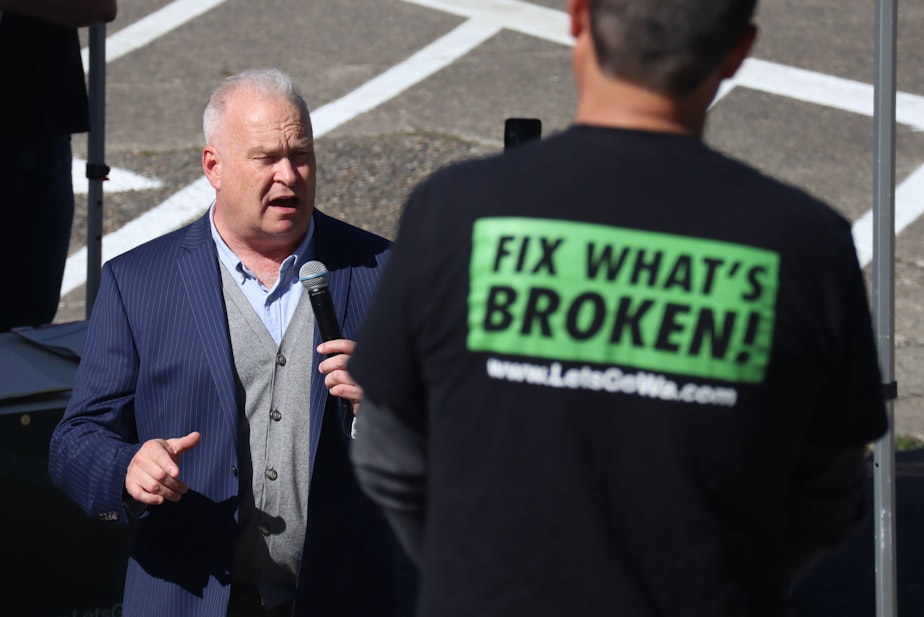WA judge tosses out GOP lawsuit, says initiatives' financial impact can appear on voter ballots

The lawsuit aimed to block information from November ballots explaining how three voter initiatives would impact the state budget.
A Thurston County judge ruled Friday that Washington state officials can place information about the financial impact of three voter initiatives on ballots this fall.
It comes after two key Republicans in the state filed a lawsuit to prevent that from happening.
They filed the legal complaint as officials make plans to apply a new law to the three ballot initiatives going to voters in November. The three measures would repeal the state’s capital gains tax, make the WA Cares long-term care payroll tax optional, and repeal the state’s carbon emissions auctions program, which is a central part of Washington’s Climate Commitment Act.
Under a 2022 law, the state has to spell out for voters how initiatives modifying taxes or fees would affect the state budget, and the explanation of the initiatives’ impact must appear directly on voters’ ballots. Those descriptions are supposed to be neutrally worded, and no more than 10 to 15 words long.
This year marks the first opportunity for the law to be used because no other initiative measures have gone to voters since the law was passed.
Sponsored
But Jim Walsh, a state lawmaker and chair of the Washington State Republican Party joined with Deanna Martinez, chair of the Mainstream Republicans of Washington, to file a legal complaint seeking to prevent that financial disclosure from appearing on voters’ ballots.
They argued that the carbon auctions and WA Cares contributions do not technically feature a tax or a fee as defined by the state laws that created them.The state, meanwhile, argued that the disclosure requirements do apply. The state’s arguments were rooted in the legislature’s “intent” when it created the 2022 disclosure law, as well as previous court decisions offering a broad definition of “taxes and fees.”
The lawsuit also claimed that the state’s recent ban on income taxes nullifies the capital gains tax – meaning the initiative seeking to repeal the tax would have no impact on state revenues. But lawyers for the state countered that lawmakers did not approve the new ban on income taxes with the intent of invalidating the capital gains tax, and to interpret the measure that way would have larger implications for the state’s tax code.
At a hearing Friday, Thurston County Superior Court Judge Allyson Zipp sided with the state, denying the requests from Walsh and Martinez.
That means unless Walsh and Martinez successfully appeal, those disclosures will appear on November ballots.
Sponsored
Shortly after the decision, Walsh said he hadn’t determined whether or not to appeal – but that time was limited to do so.
In a video posted to social media following Zipp’s decision, Walsh said the goal of the lawsuit is to reduce the possibility that state officials can “weaponize” the disclosure statements to discourage voters from supporting them.
“We don’t mind the idea of more information,” Walsh said. “What we’re concerned about is it won’t be impartial information.”
Meanwhile, groups who oppose the voter initiatives released statements praising the decision Friday afternoon.
“Their lawsuit had one inexcusable purpose: to hide the truth about the impacts of their initiatives from voters,” said Aaron Ostrom, executive director of the progressive advocacy group Fuse Washington. “When voters learn what their destructive, deceptive initiatives actually do, it’s game over for them.”
Sponsored
The capital gains tax has collected more than a billion dollars for the state’s current two-year budget, while lawmakers have mapped out more than $3 billion in spending based on revenue from the carbon auctions over the next couple of years. The WA Cares payroll tax funds go toward building up the state’s long-term care benefit program that Washingtonians will begin to access in 2026.
[Copyright 2024 NWNews]




